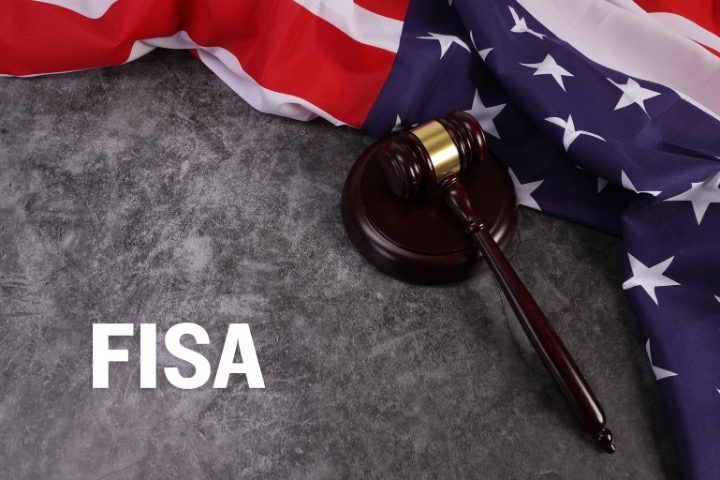
The FBI’s repeated misuse and abuse of Section 702 of the Foreign Intelligence Surveillance Act has been popping up in news cycles for the past few years. And while the FBI claims to have addressed those misuses and abuses, the reality is that the agency has been shown to have been playing a shell game. As a direct result of the FBI’s actions, the future of Section 702 is uncertain.
Section 702 is the portion of the Foreign Intelligence Surveillance Act that authorizes much of the Surveillance State’s activities. This writer is careful to say “much of,” since a major chunk of the activities of the Surveillance State are not authorized at all. But even Section 702 ostensibly limits the surveillance activities of the NSA, CIA, FBI, and other three-letter federal agencies. It appears, though, that even those limits are theoretical, at best — as demonstrated by the FBI’s illegal use of a Section 702 foreign-spying tool to search for information on defendants accused of crimes related to the events of January 6.
Now, as a result of that illegal use, Section 702 — which must be reauthorized from time to time — is facing renewed and vigorous scrutiny, as it is up for reauthorization before it sunsets on December 31.
As The Wall Street Journal reported in February:
U.S. intelligence officials are bracing for a fight in Congress over the renewal of a foreign surveillance tool they say is critical to fighting terrorism, thwarting hackers and spying on top rivals like China and Russia, but one that lawmakers in both parties say intrudes on Americans’ privacy.
The Journal more recently reported on the uphill fight for the reauthorization of Section 702, saying:
The revelation that the Federal Bureau of Investigation used a foreign-spying tool to search for information about defendants in the Jan. 6 attack on the U.S. Capitol and the 2020 George Floyd protests has set back the Biden administration’s effort to win reauthorization of a law it says is a critical tool for national security, lawmakers in both parties said.
The FBI said the wrongful use of the spying tool, described in a heavily redacted April 2022 opinion from a secret court that oversees foreign surveillance, took place before changes by the agency meant to better protect Americans’ privacy. But some lawmakers have said they don’t believe those changes alone are sufficient, and said Congress must rewrite the law that authorizes the spying program, which is due to expire at year’s end, rather than merely renew it as it stands.
And while the FBI claims to have amended its wicked ways and double pinky promises that it is now working feverishly to protect Americans’ privacy, it is not just some members of Congress that doubt those claims. After all, what reasonable person would take the word of an agency that has repeatedly been caught lying about the same thing?
One organization that has drilled down into the FBI’s claims of reform is the Electronic Frontier Foundation (EFF). The EFF has weighed the FBI’s promises against the data, and in the final analysis has found the FBI wanting. As the EFF reported in late April:
The Federal Bureau of Investigation (FBI) has released internal documents used to guide agency personnel on how to search the massive databases of information collected under the Foreign Intelligence Surveillance Act, including communications collected without a warrant under Section 702. Despite reassurances from the intelligence community about its “culture of compliance,” these documents depict almost no substantial consideration of privacy or civil liberties. They also suggest that in the years before these guidelines were written, even amidst widespread FBI misuse of the databases to search for Americans’ communications, there were even fewer written guidelines governing their use. Above all, FBI agents can still search for and read Americans’ private communications collected under Section 702, all without a warrant or judicial oversight.
Based on both the FBI’s oft-broken promises of reform and the basic American principle that surveillance should always require a warrant, the EFF publicly called for the end of Section 702, writing:
After a string of scandals, these newly released documents demonstrate some of the steps the FBI took to train personnel who apparently did not understand how to stay within the law’s extremely broad mandate. Namely, to query the collected communications of U.S. persons only if they are investigating foreign intelligence, a crime, or both, still without judicial review. According to FBI director and media reports, these guidelines led to a significant drop in unauthorized searches, but even this “dramatic” drop still allegedly resulted in over two hundred thousand warrantless searches of Americans’ private communications in 2022 alone. That’s two hundred thousand too many; Congress should close the “backdoor loophole” and require the FBI to get a search warrant.
And while Section 702 has been reauthorized every time the sun appears ready to set on this Orwellian provision, this time things appear different. Even advocates of the reauthorization of Section 702 predict difficulty getting their privacy-threatening blank check renewed. Avril Haines, the U.S. director of national intelligence — who describes Section 702 as “fundamental” and “absolutely critical” — said reauthorization “will be extremely challenging, honestly.”
The Journal quotes Representative Darin LaHood (R-Ill.) as saying, “Egregious FISA abuses by the FBI underscore the need for Congress to reform 702 to better protect the civil liberties of Americans.” LaHood is leading “a small group of lawmakers drafting potential changes to the law,” which he says “will continue to work towards reform that ensures these types of abuses never happen again.”
The move toward rewriting Section 702 rather than simply reauthorizing it would mean passing a “new and improved” piece of surveillance legislation at a time when many Americans and their elected officials are beginning to push back against warrantless surveillance. This likely means one of two things: (1) Such legislation would stall in Congress, or (2) it would be just another piece of misnomer legislation (PATRIOT Act comes to mind) promising reform while merely repackaging the same old stuff — or worse.
Section 702 has been misused and abused since its inception. But that was always the point. A law that allows a secret court to secretly authorize secret surveillance is designed for misuse and abuse. Indeed, one can scarcely imagine a use that would not be abuse. This writer and this magazine agree with the EFF that it is time for Section 702 and the whole FISA system to be torn down and relegated to the trash heap of history. And given the FBI’s disdain for the God-given rights of Americans, perhaps it should follow Section 702 into oblivion.




